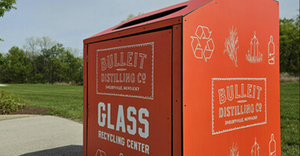Recycling's Fatal Paradox
How many times have you been told that if we just "close the loop and buy recycled" we can solve recycling's economic problems? The logic behind this slogan is simple enough. More demand for recycled content products means more manufacturing capacity using recyclables as a raw material. As demand and capacity increase, the revenues received by recycling programs also should increase.
Unfortunately, larger markets are no guarantee that recyclers will receive more money for their efforts.
The problem is simple. Collectors and processors of recyclables have different needs from businesses that use recyclables as a raw material. Collectors and processors want top dollar for their recyclables. They want to maximize their revenue to cover costs and make a profit. However, manufacturers do not want to pay top dollar for their raw materials. They want to keep their costs down so that they can have an economic advantage over their competitors.
On several occasions, I've heard manufacturers of recycled raw materials boast that the low prices they pay for recyclables is the key to their profitability. Of course, this means that haulers who collect recyclables and operate materials recovery facilities (MRFs) will be at the short end of the economic stick - unless they can find other revenues to sustain their recycling services.
Recycling's fatal paradox is that increased demand for recyclables does not necessarily equal higher prices for those recyclables. Those prices are subject to other variables besides increased demand, such as the supply of raw materials for that end-product, the prices of competing raw materials and the demand for the end-product.
If you don't believe me, just check the price history of aluminum beverage containers. Aluminum has enjoyed a reputation as the highest valued recyclable. Yet market prices for aluminum have nothing to do with the size of the recycled beverage can market and it has everything to do with the aluminum industry's overall need for raw material and the demand for all of its end-products. Remember the price collapse in the value of used aluminum cans when the Russians dumped bauxite on world markets several years ago?
Before the advent of mandated recycling programs, this tension between the needs of suppliers and their end-markets wasn't as big a problem as it is today. When end-markets lowered their prices, scrap and waste paper dealers would pay less to their suppliers and, in effect, turn down the supply spigot. When raw material prices rose, they would increase prices and turn the supply spigot up again. With today's mandated programs, these natural market mechanisms no longer work.
Yes, we need to continue to emphasize market development and buying recycled. But let's not kid ourselves. Market development does not guarantee well-paying markets, nor does it guarantee that recycling programs will have increased revenues. Mandated recycling is a service. It should pay for itself from service fees, not from the revenues raised by selling recyclables.
About the Author(s)
You May Also Like




